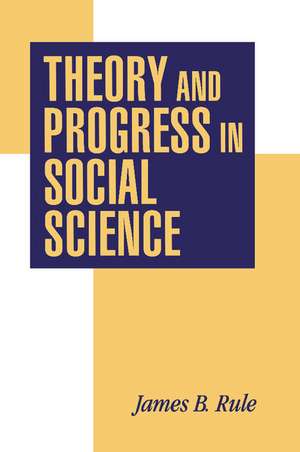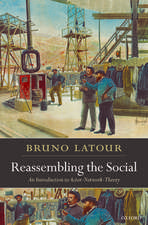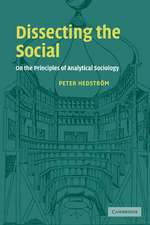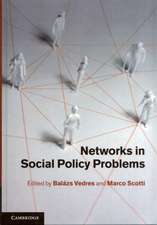Theory and Progress in Social Science
Autor James B. Ruleen Limba Engleză Paperback – 27 apr 1997
| Toate formatele și edițiile | Preț | Express |
|---|---|---|
| Paperback (1) | 287.87 lei 6-8 săpt. | |
| Cambridge University Press – 27 apr 1997 | 287.87 lei 6-8 săpt. | |
| Hardback (1) | 695.93 lei 6-8 săpt. | |
| Cambridge University Press – 27 apr 1997 | 695.93 lei 6-8 săpt. |
Preț: 287.87 lei
Nou
Puncte Express: 432
Preț estimativ în valută:
55.09€ • 56.84$ • 46.63£
55.09€ • 56.84$ • 46.63£
Carte tipărită la comandă
Livrare economică 04-18 martie
Preluare comenzi: 021 569.72.76
Specificații
ISBN-13: 9780521574945
ISBN-10: 0521574943
Pagini: 272
Ilustrații: 1 b/w illus.
Dimensiuni: 153 x 230 x 18 mm
Greutate: 0.45 kg
Ediția:New.
Editura: Cambridge University Press
Colecția Cambridge University Press
Locul publicării:New York, United States
ISBN-10: 0521574943
Pagini: 272
Ilustrații: 1 b/w illus.
Dimensiuni: 153 x 230 x 18 mm
Greutate: 0.45 kg
Ediția:New.
Editura: Cambridge University Press
Colecția Cambridge University Press
Locul publicării:New York, United States
Cuprins
Introduction: Progress: formal and substantive; 1. Dilemmas of intellectual progress; 2. The reckoning of progress; Introduction to Part II; 3. Rational choice; 4. From Parsons to Alexander: closure through theoretical generality; 5. Network analysis; 6. Feminist analysis in social science James Rule and Leslie Irvine; Introduction to Part III; 7. Theory as expression; 8. Theory for coping; 9. Summary and conclusion.
Recenzii
"Theory and Progress in Social Science is a perceptive, thought-provoking book--an invitation to sensible thinking about theory in social science during an era when too much jargonistic solipsism prevails." Theda Skocpol, Harvard University
"James Rule's book is a unique analysis of the fate of a wide variety of research programs in social science, from formerly fashionable to currently theoretically correct. The book is written elegantly, forcefully, and - most importantly - with great clarity. It will be indispensable in any course on contemporary social theory." Robert R. Alford, City University of New York Graduate Center
"This book shines with sense and intelligence. Rule asks why social theory is so rarely cumulative, why fashion seems as important as progress in its sequences. Carefully, he mounts a polite polemic against the blustering imperialism that so often characterizes contemporary theories. All those interested in improving the quality of sociological discourse should read this book." Michael Mann, University of California, Los Angeles
"James Rule's pluralism is just what sociology needs. It's about time we stopped fighting with each other over the one way to truth - or tenure - and come to understand that a discipline which studies eclectic human beings needs eclectic theory." Alan Wolfe, Boston University
"An intellectual program, Rule argues, should be judged by its contribution to the first-order questions of perennial concern. Rule examines some of the most popular intellectual movements of the 1980s and 90s, among them rational choice, network analysis, and feminist theory, and asks whether they too are destined to be yet more of those carcasses of dead intellectual fashions which dot the landscape of 20th-century social science." Randall Collins, University of California, Riverside
"Rule is well worth reading.... The book's pleasing candor and lucid style recommend it as an antidote to the often beguiling but usually misleading claims of social theory." Kiernan Healy, Theory & Society
"...the issues he raises are likely to stimulate thought. Rule's ideas will be useful to those interested in theory and the sociology of science, as well as to anyone who has tried to explain the point of their research to outsiders." Christine Horne, American Jrnl of Sociology
"Rule has an answer that is well worth pondering." Anthony Oberschall, Social Forces
"James Rule's book is a unique analysis of the fate of a wide variety of research programs in social science, from formerly fashionable to currently theoretically correct. The book is written elegantly, forcefully, and - most importantly - with great clarity. It will be indispensable in any course on contemporary social theory." Robert R. Alford, City University of New York Graduate Center
"This book shines with sense and intelligence. Rule asks why social theory is so rarely cumulative, why fashion seems as important as progress in its sequences. Carefully, he mounts a polite polemic against the blustering imperialism that so often characterizes contemporary theories. All those interested in improving the quality of sociological discourse should read this book." Michael Mann, University of California, Los Angeles
"James Rule's pluralism is just what sociology needs. It's about time we stopped fighting with each other over the one way to truth - or tenure - and come to understand that a discipline which studies eclectic human beings needs eclectic theory." Alan Wolfe, Boston University
"An intellectual program, Rule argues, should be judged by its contribution to the first-order questions of perennial concern. Rule examines some of the most popular intellectual movements of the 1980s and 90s, among them rational choice, network analysis, and feminist theory, and asks whether they too are destined to be yet more of those carcasses of dead intellectual fashions which dot the landscape of 20th-century social science." Randall Collins, University of California, Riverside
"Rule is well worth reading.... The book's pleasing candor and lucid style recommend it as an antidote to the often beguiling but usually misleading claims of social theory." Kiernan Healy, Theory & Society
"...the issues he raises are likely to stimulate thought. Rule's ideas will be useful to those interested in theory and the sociology of science, as well as to anyone who has tried to explain the point of their research to outsiders." Christine Horne, American Jrnl of Sociology
"Rule has an answer that is well worth pondering." Anthony Oberschall, Social Forces
Descriere
This work asks if social inquiry can truly be considered a progressive 'science'.

















